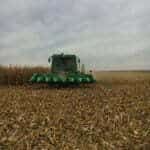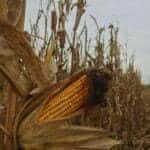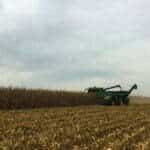


Harvest is a busy time for farmers, as they often have a narrow window to complete their work. It’s important farmers take care of themselves to ensure a safe and productive season.
“Be sure to take care of yourself during harvest,” said Dave Merrell, chairman of the Nebraska Corn Board and farmer from St. Edward, Nebraska. “During long hours, take time for short breaks. It may seem unproductive, but it’s good for you. Make sure to get enough sleep and take the time to eat healthy. This will help you be alert and engaged while operating large machinery.”
Farmers are not the only people who should be cautious during the harvest season. Anyone who may be visiting or traveling through rural areas should be mindful of increased farm traffic on roads and highways. Harvest equipment should be visible with front and rear warning lights, as well as slow moving vehicle emblems to notify motorists of approaching machinery. In rural areas, parents of small children should also develop safety rules to prevent youth from playing on or near harvest equipment.
Additional tips for farmers, farm workers and rural residents to consider while on the farm this fall (adapted from the National Corn Growers Association):
Equipment Safety
- Be careful when approaching harvest equipment. Approach from the front and gain eye contact with the operator before approaching.
- Ensure the harvesting equipment is fully stopped and disengaged before climbing onto a vehicle.
- Do not place yourself near any unguarded or otherwise running machinery.
- Avoid pinch points between equipment – such as tractors with grain wagons. Visibility can be limited and serious injury can occur.
Entanglement Hazard
- Entanglement hazards can happen very quickly.
- Do not ever try to unplug any equipment without disengaging power and removing energy from the equipment.
- Never pull or try to remove plugged plants from an operating machine.
- Always keep shields in place to avoid snags and entanglement when working around equipment.
Fall Hazard
- Be careful climbing on and off equipment.
- Be alert and extremely careful when working in wet or slippery conditions.
- Keep all walkways and platforms open and free of tools, dust, debris or other obstacles. Clean all walkways and platforms before use.
- Wear clothing that is well fitting and not baggy or loose. Also wear proper non-slip, closed toe shoes.
- Use grab bars when mounting or dismounting machinery. Face machinery when dismounting and never jump from equipment.
- Never dismount from a moving vehicle.
Fire Prevention
- Carry a fire extinguisher with you in your vehicle (A-B-C, 5 or 10 pound).
- Remove dust and buildup from equipment. Check bearings regularly to prevent overheating and chance of fire.
Grain Wagon Safety
- Be careful to monitor grain wagon weight to never exceed maximum weight limits. As weight increases, grain wagons can be more difficult to control.
- Load grain wagons evenly to distribute weight to prevent weaving or instability across the grain wagon.
- Inspect grain wagon tires and replace any worn or cracked tires.
Grain Bin Safety
- If entering a bin, wear a harness attached to a secure rope.
- Never work alone.
- Never allow children to get too close or inside the bin.
- Wear a dust filter or respirator when working in bins.
- Stay out of bins when equipment is running.
“All of us want to get our crop in the bin and we’re usually racing weather in the process, but we all need to take a second for safety,” said Wesely. “Never take a shortcut when it comes to safety and commonsense. A few seconds truly could save you or someone you care about from injury or even worse.”
The Nebraska Corn Board (NCB) is a state-funded agency funded through a ½-cent-per-bushel checkoff on all corn marketed in the state. The mission of the NCB is to promote the value of corn by creating opportunities. Checkoff funds are invested in programs of market development, research, promotion and education. The NCB is made up of nine farmer directors.
The Nebraska Corn Growers Association (NeCGA) is a grassroots commodity organization that works to enhance the profitability of corn producers. NeCGA has more than 2,400 dues-paying members in Nebraska. NeCGA is affiliated with the National Corn Growers Association, which has more than 40,000 dues-paying members nationwide.
Related Articles
Radicle Growth Launches the Radicle Corn Challenge Sponsored by U.S. Corn Farmers to Drive New Demand for Corn
Radicle Growth has announced the launch of The Radicle Corn Challenge sponsored by U.S. corn farmers, a global call for startups developing technologies that create new, durable demand for corn through innovative products, materials [...]
The Nebraska Corn Board Is Seeking Applications for Ethanol Infrastructure Grant Program
The Nebraska Corn Board (NCB) is accepting applications for the Ethanol Infrastructure Grant Program, which helps Nebraska fuel retailers add or expand higher ethanol blend options such as E15, E30 and E85. The program [...]

